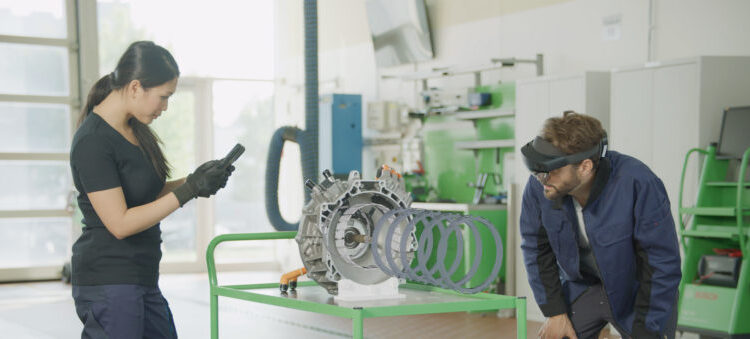When it comes to the mobility of the future, advanced technologies and digital skills are playing an increasingly important role. Artificial intelligence, cloud computing or mixed reality technology offer innovative opportunities for automotive manufacturers and suppliers.
Microsoft – as a strategic partner of the automotive industry – will be at the International Motor Show (IAA) for the first time this year and will show the digital potential of the industry together with partners. Among them are Bosch and RE’FLEKT as exclusive HoloLens 2 corporate partners and present one of the first technologies that are supported by the new version of mixed reality glasses and focuses on knowledge transfer in the automotive industry.
Collaborative Training 4.0 with mixed reality technology
The Collaborative Training 4.0 from Bosch is part of the Bosch Common Augmented Reality Platform (CAP). The end-to-end solution works with mixed reality technology and was created on the basis of REFLEKT ONE. The interactive training offers holographic step-by-step instructions that help workshop trainees to understand new products and technologies and enables service technicians to work more efficiently and error-free during repairs and maintenance. For example, a technician on site can access ready-made, quickly understandable instructions that can be retrieved via various end devices, such as Microsoft HoloLens 2, and projected directly onto machines and systems.
Click here to load media
CAP is used in training centers for new and innovative training methods as well as workshop assignments. The platform enables quick and easy integration of digital and visual content into technical documentation, repair manuals, training programs and sales platforms. The system of the mixed reality partner REFLEKT was used as the basis for the development of the CAP platform. This makes it easy to create and update scenarios for vehicle repairs and improvements. This makes companies like Bosch more agile, as changes and new information can be easily integrated into training courses and the workshop is reached faster.
The interactive nature of the training solutions also optimizes the quality and time required for training and reduces the corresponding costs by minimizing downtime and increasing the efficiency of business processes. The use of mixed reality technologies also increases the speed and quality of vehicle repairs. On average, companies can save more than 15 percent per step – even with conventional vehicles and less demanding repair tasks.
A blog post by Ronja Fink
Communications Manager student employee









